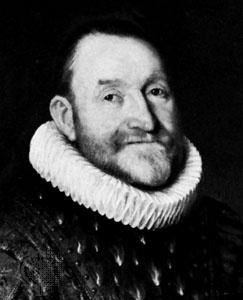Aubigné, Théodore-Agrippa d'
French soldier and author
born Feb. 8, 1552, Pons, Fr.
died April 29, 1630, Geneva
 major late 16th-century poet, renowned Huguenot captain, polemicist, and historian of his own times. After studies in Paris, Orléans, Geneva, and Lyon, he joined the Huguenot forces and served throughout the Wars of Religion on the battlefield and in the council chamber. He was écuyer (“master of horse”) to Henry of Navarre. After Henry's accession to the French throne as Henry IV (1589) and his abjuration of Protestantism, Aubigné withdrew to his estates in Poitou. Under the regency of Marie de Médicis, his intransigence estranged him from his Huguenot brethren. Proscribed in 1620, he took refuge in Geneva, where he remained until his death. His closing years were clouded by the disreputable conduct of his son Constant—father of Madame de Maintenon, second and secret wife of Louis XIV.
major late 16th-century poet, renowned Huguenot captain, polemicist, and historian of his own times. After studies in Paris, Orléans, Geneva, and Lyon, he joined the Huguenot forces and served throughout the Wars of Religion on the battlefield and in the council chamber. He was écuyer (“master of horse”) to Henry of Navarre. After Henry's accession to the French throne as Henry IV (1589) and his abjuration of Protestantism, Aubigné withdrew to his estates in Poitou. Under the regency of Marie de Médicis, his intransigence estranged him from his Huguenot brethren. Proscribed in 1620, he took refuge in Geneva, where he remained until his death. His closing years were clouded by the disreputable conduct of his son Constant—father of Madame de Maintenon, second and secret wife of Louis XIV.Among Aubigné's prose works, the Confession catholique du sieur de Sancy, first published in 1660, is a parody, ironically dedicated to Cardinal Duperron, of the tortuous explanations offered by Protestants who followed Henry IV's example of abjuration. His comment on life and manners ranges more widely in the Adventures du baron de Faeneste (1617), in which the Gascon Faeneste represents attachment to outward appearances (le paraître) while honest squire Énay, embodying the principle of true being (l'être), tries to clear Faeneste's mind of cant. The Histoire universelle deals with the period from 1553 to 1602, with an appendix to cover the death of Henry IV (1610); an unfinished supplement was meant to bring the story up to 1622. The chief interest of the Histoire lies in its eyewitness accounts and in the liveliness of Aubigné's writing.
His major poem in seven cantos, the Tragiques, begun in 1577 (published 1616), celebrates the justice of God, who on the Day of Doom will gloriously avenge his slaughtered saints. The subject matter, the sectarian bias, and the uneven composition and expression are offset by many passages of great poetic power, often lyrical in their Biblical language and noble in the despairing intensity of their invective. The scope of the design confers epic grandeur on the work. Modern research on Baroque literature has awakened interest in Aubigné's youthful love poetry, collected in the Printemps (1570–73, unpublished). It remained in manuscript until 1874. In these poems the stock characters and phraseology, modelled on Petrarch, are transmuted into a highly personal style, full of tragic resonances, by Aubigné's characteristic vehemence of passion and force of imagination.
- Ben-hadad I
- Ben Hecht
- Ben Hogan
- Beni Abbès
- Beniamino Gigli
- beni-e
- Benigni, Roberto
- Benigno Simeon Aquino, Jr.
- Benigno Simeon, Jr. Aquino
- Beni Hasan
- Beni Isguene
- Beni Mellal
- Benin
- Benin, Bight of
- Benin City
- Benin, flag of
- Beni River
- Beni Saf
- Benito Jerónimo Feijóo y Montenegro
- Benito Juárez
- Benito Lynch
- Benito Mussolini
- Benito Pérez Galdós
- Benivieni, Girolamo
- Benjamin